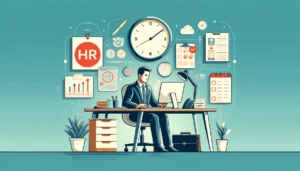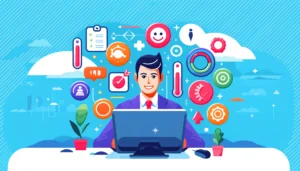Identifying and crafting our future at work
- 13 Min Read
Everyone has their own opinion about the future of work. Some people are convinced that we will become a world full of robots, others believe entirely in remote working – which might run the risk of team building issues and loneliness. We also need to consider the aging workforce and opportunities for them. There are a plethora of outcomes to consider, but which one is likely to take the lead?
- Author: Emily Sexton-Brown
- Date published: Mar 6, 2018
- Categories

Identifying the future of work is a vast and complicated landscape that no-one really has an exact answer to. The world of work is shifting into two very contrasting halves, the first being softer skills, with an emphasis on organisations being driven by razor-sharp emotional intelligence and an inordinate amount of pressure on leaders to balance strategy, with human emotion but also entirely justifying every pound spent for overall ROI. The second half is automation and AI, which theoretically leaves no room for error. Machines are accurate and reliable – allowing humans to innovate and create.

We decided to voice this question to a group of HR experts, all coming as this multifaceted question from entirely different industries, with different outlooks, pressures, and expectations on them.
“Ironically, one of the greatest threats to work-life balance is the rise of constant connectivity as, while enabling employees to work flexibly and remotely, it also makes it more and more difficult for them to switch off from work.” – Shaun Subel, Strategy Director at VitalityHealth
So, what does the future hold for HR and what does that mean for the future of work?
Anne Sheehan, Enterprise Director, Vodafone UK
Over the last decade there’s been a huge shift in the way we work thanks to developments in connectivity and technology. These developments have made it easier for people to work wherever and whenever they need to, with greater speed and better results. By putting mobile and digital at the heart of the workplace, with people, processes and information interconnected, employees become more agile. They’re also able to work more effectively, be more productive and better meet customers’ needs – both in and out of the office. Our Working in the UK research revealed that 43% of employees work from a customer or project site to some extent.
This reinforces technology’s role in creating a workforce that’s better connected and more collaborative.
Jenny Taylor, UK Graduate Apprenticeship and Student Programme Leader at IBM
… what does the future hold for the world of work and HR?
The digital revolution is changing the face of British businesses. In turn, businesses must adapt to fit a changing workforce if they wish to innovate at the same rate as the emerging technologies that are transforming their industries. It is time for businesses to address issues such as the skills debt and the economic realities of training workers. The technology industry, in particular, faces the challenge of a significant skills shortage – especially with regards to recruiting high quality IT employees fit for ‘new collar jobs’. These jobs require vocational training and development of technical skills over traditional style academics. So how can companies hire for the business of the future, ensuring that their workforce are fully equipped to take on roles that go hand in hand with emerging technologies?
Firstly, there needs to be a change in perceptions around vocational courses. It is only with a change in attitudes to traditional methods of hiring that the skills gap can really be addressed. As we celebrate National Apprenticeship Week, it is time for employers to reflect on the value of taking on apprentices. Successful apprenticeship programmes provide fresh and insightful ways of businesses remaining inclusive and contemporary, and are an excellent way for companies to ensure that technology moves along with the next generation. What’s more, businesses set to gain trained, loyal and high-quality professionals. Indeed, IBM has found that apprenticeship retention is high.
Never has it been more apparent that huge change is needed to support the dramatic acceleration and evolution of technology. In order to do this all stakeholders must come together to ensure that apprentices gain the skills they need to actively contribute to Britain’s digital future. It is only by openly acknowledging this necessity for collaboration that businesses will be able to dismantle long-held social and institutional perceptions of apprenticeships as the ‘poor relation’ of university education.
Dave Millner, Executive Consulting Partner, IBM Workforce Science and the @HRCurator (on twitter)
… what does the future hold for the world of work and HR?
The future of HR for me revolves around 4 key themes, embracing technology that enables HR to focus on added value activity, commercial bottom line focus, designing organizations for the future and building capabilities to meet the new demands being made of HR.
Technology is critical to HR’s future, whether it is chatbots, augmented intelligence-based systems or new platforms to operate by – all of them require careful and robust testing and implementation to ensure that the credibility of HR is enhanced by these methods and provides an aligned database for the future. This leads to the need to have a commercial bottom line focus. For years I’ve been talking about HR as a profit centre not a cost centre and we need to make a mind-set shift that focuses on revenue and growth not just cost (which to be honest is relatively limited) and hence the focus on analytics – it demonstrates HR’s value! We’ve known intuitively that what we do is important and adds value but we now have to prove it and analytics is part of that challenge. Additionally, analytics is not just not just for the large corporates, every HR function should focus on this for the future – we have to talk the organisations language (money, cash etc.) not our own language.
The future of work and the challenges that a more digital environment will bring are an amazing opportunity for HR to get on the front foot and help shape and design what that future organisation should look like. Organisational design seems to have fallen off the HR toolkit and is one of the most strategic interventions we can get involved with. Yes there are no clear answers but that is where we have to challenge and shape the business to understand the reality of new technologies, new processes and most importantly the employee experience as change continues to become the “new normal”.
Finally, the need for a mind-set and a set of behaviours that drive performance, challenge the business and facilitate the future are crucial and we need to move away from being just a knowledge-based discipline. Of course, our knowledge domain is vital but the behaviours we operate by in the future will shape the perceptions and ultimately our credibility with leaders at all levels.
“Home and remote working should be the norm in all companies.” – Andy Thompson, HR Manager, Bede Gaming
Inji Duducu, People Director, Rewards & Employee Services, Morrisons
… what does the future hold for the world of work and HR?

The future of work will be both highly automated and highly human. The rate of automation is picking up pace, and though I’m not convinced by the “half of all jobs gone by 2030” hype, it’s easy to see how machine learning and robotics will do more and more work. Conversely, jobs will remain where customers require something that is uniquely and essentially human.
Machines might be able to fool us online, but face to face we know what people are like, and our brains are particularly attuned to social interaction. We will want service, healthcare, complaint handling and leadership (among other things) from a human being. There could also be some fascinating interfaces – for example, (at the moment) people are required to write the personalities of your AI and chatbots – a whole new creative industry, I can’t get my head around the economic implications of increasing automation. I see some predictions that we will all work less but be better paid – wishful thinking maybe? We might have considerable underemployment or unemployment – will the benefits be shared so that customers can afford the goods and services the robots produce?
Only time will tell!
In the meantime I am teaching my kids two things:
1) If your future job depends on your uniquely human social and relationship skills relationships then you’d better be good at them
2) Be polite to Alexa, so when machines take over they will know you welcome your new robot overlords.
Shaun Subel, Strategy Director at VitalityHealth
… what does the future hold for the world of work and HR?
A number of factors are driving the rapid evolution of the modern workplace. Millennials, who form a growing proportion of the workforce, have different expectations of employers than previous generations – of increasing importance are employers’ attitudes towards workplace health and wellbeing, work-life balance, and even social and political issues. At the same time, technology has changed the work environment itself, with increasing digitalisation and remote-working techniques to an extent rendering the concept of a workplace obsolete.
A variety of key challenges for employers are emerging as a result. Ironically, one of the greatest threats to work-life balance is the rise of constant connectivity as, while enabling employees to work flexibly and remotely, it also makes it more and more difficult for them to switch off from work. This has a negative effect on both their health and productivity. In addition, research from Britain’s Healthiest Workplace has shown that while flexible working arrangements can be beneficial for employees’ health and productivity, the ability to work from home, a key benefit of technology, does not bring the same benefits. This highlights the importance of a physical workplace, and the positive social connections and networks that exist there, in supporting employees to make healthy choices.
Additionally, the demographic shift in employee populations is creating a number of complexities for employers. Our research shows that while the average UK employee has a reduced life expectancy of around four years as a result of their physical and mental wellbeing risks, the risk factors affecting employees differ substantially depending on their age. Of particular concern is the fact that mental health issues are magnified among younger generations, with employees under the age of thirty reporting significantly higher incidence of depression and work-related stress. Whether this is a naturally occurring demographic trend which may improve over time, or a result of the changing demands of the workplace on individuals, remains to be seen.
Taking note of the challenges, it is clear that investing in the health and wellbeing of staff should be a top priority for employers going forward. It is a desirable benefit for all ages, particularly the growing proportion of younger workers; it helps to mitigate the negative effects of stress and other mental health issues that are prevalent in the younger workforce; it enables employees to be healthier and more productive; and it reduces the sickness burden, a clear societal benefit. However, employers must increasingly recognise that a one-size-fits all approach to managing the health and productivity of their workforce is not effective. The composition of the workforce will continue to change, and employers must consider how to integrate new employees, new work practices and new technologies to create a work environment that better enables employee health, engagement and productivity.
Neil Humphreys, Partner, Howgate Sable
… what does the future hold for the world of work and HR?
The millennial-minded generation, who are now entering leadership positions in numbers, will undoubtedly help define the culture of the early 21st century workplace. They’re armed with fresh ideas, attitudes and technical knowledge, and this is making them attractive to forward-thinking businesses.
In today’s rapidly changing market, attracting and retaining talent is often a priority to secure the future growth and success of the organisation. Millennial-minded executives will make up the majority of the board in the near future, so they will have a significant influence on the dynamic of the workplace. They will expect freedom, independence, recognition and control of their own destiny, as in fairness did their predecessors. We also have to understand the key differentiator is technology. The eldest ‘Millienial’ is 38, they are not a homogenous group but have a better grasp of operating in a technologically enabled world than their predecessors.
Current execs also need to consider how their behaviour and leadership techniques will create the benchmark for their successors. Every generation has its own approach to work and millennials often challenge corporate cultures that have taken years to implement. Businesses should encourage a balanced board and a mix of voices, but there needs to be an element of discipline and boundaries to maintain the internal stability of the organisation.
Jan Mueller, Managing Director of Talent Acquisition Solutions, EMEA, Futurestep
… what does the future hold for the world of work and HR?
Living in a digital revolution, which is at least as significant as the industrial revolution, technology is shaking the foundations of the workforce. Indeed, computers are already surpassing the human brain at sheer processing, and the true era of Artificial Intelligence is not too far away. In fact, our latest global research found that almost 9-in-10 talent acquisition professionals said they are “excited” by the prospect of working more closely with AI, and only 11% thought AI would replace their jobs.
Although emerging technologies such as AI is set to reshape the future of work, it will be humans who will really accelerate its impact. For instance, technology like AI will help remove the mundane process side of things, helping free up time for employees to do more creative work, whilst data analytics will provide powerful insights that can enhance decision-making and inform more valuable relationships.
So what’s the answer to help people and technology work together? Immediate changes to education will be needed in order to upskill the workforce for the expertise needed in the future, such as creative thinking, problem-solving and agility. But it doesn’t stop there. Current employees must also be given continuous training opportunities too in order to acquire new, specific knowledge and skills, often related to technology and its applications.
With an underlining concern that automation will replace humans’ jobs in the future, it’s important that business leaders, politicians, and workers’ representatives ensure a true partnership between people and technology in a bid to reveal greater value for organisations.
“Machines might be able to fool us online, but face to face we know what people are like, and our brains are particularly attuned to social interaction.” – Inji Duducu, People Director – Reward & Employee Services, Morrisons
 Andy Thompson, HR Manager, Bede Gaming
Andy Thompson, HR Manager, Bede Gaming
… what does the future hold for the world of work and HR?
The future of work has to be focused on people and technology. I still see a lot of companies still using outdated practices when it comes to how they treat their people and what technology they use to run their day to day operations. Collaborative tools like Trello, Slack, Jira and many others help departments be much more efficient and productive. Companies need to treat their staff like adults and give them the flexibility to work when they want, and from wherever they want – home and remote working should be the norm in all companies.
Some people assume that someone who works remotely is more distracted because their ‘boss’ isn’t within shouting distance and can’t keep tabs on them. But, a study by the Harvard Business Review disproves this, noting some companies saw worker productivity increase by 13.5% after permitting remote work. Of course, you need to hire the right people in order for this to work, but then hiring the right people should be the core focus of any business because it is people who will drive the culture.”Culture eats strategy for breakfast”.








